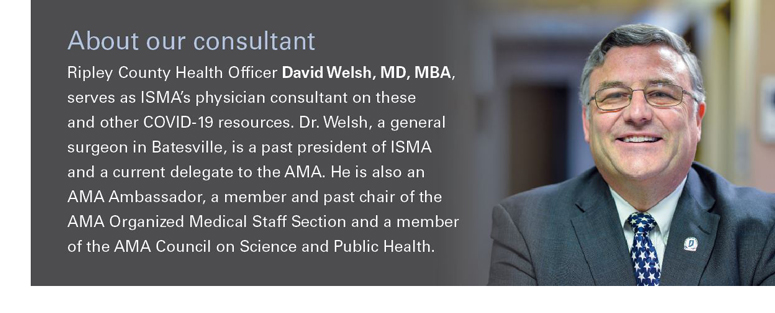
For Indiana to overcome the coronavirus pandemic, it is critical that physicians and their staff have confidence in the safety and efficacy of COVID-19 vaccines. A survey by the Kaiser Family Foundation recently found that 29% of health care workers and 27% of the general population were “vaccine hesitant.” Fortunately, physicians are in a unique position to address concerns about the vaccines: Surveys consistently show that Americans look to their doctors as trusted sources of information.
To help physicians reassure staff and patients that the vaccines are safe, ISMA worked with
Past President David Welsh, MD, MBA, Ripley County health officer, to compile answers to the most common questions about vaccine safety.
An excellent resource on vaccine safety is the two-page fact sheet,
Indiana Department of Health Covid-19 Vaccine FAQs. This colorful, easy-to-scan flyer lists the normal side effects of being vaccinated and addresses common myths and misinformation about the vaccines.
Haven’t the vaccines been rushed into production?
At the time of this writing, two COVID-19 vaccines were available, developed by Pfizer/BioNTech and Moderna. Both use messenger RNA (mRNA), a technology that has been
studied for decades. All vaccine developers must meet
rigorous standards and hold
clinical trials for their vaccines to be authorized for emergency use by the U.S. Food and Drug Administration. The safety of the vaccines is
continually monitored.
Can I get COVID from the vaccine?
You
cannot get COVID-19 from the vaccines because they do not contain any live virus. The CDC has excellent information about both the
Pfizer-BioNTech COVID-19 vaccine and
Moderna’s COVID-19 vaccine and
how mRNA vaccines work.
Will the vaccine make me sick?
Soreness and swelling may develop in the arm where you had the shot. You may also have a
fever or headache, chills and fatigue, but this means your immune system is resisting illness and that the vaccine is working.
The CDC advises that even
people with severe allergies be vaccinated, and severe reactions to the Pfizer/BioNTech and Moderna vaccines are rare. However, if you have had adverse reactions to other vaccines, the CDC recommends talking to your doctor about whether to get a COVID-19 shot.
Who should NOT receive the COVID-19 vaccine? Severe reactions to the currently available COVID-19 vaccines are rare. The
CDC recommends that you NOT receive the vaccines if you have:
- Allergies to polyethylene glycol (PEG) or polysorbate. Polysorbate is not an ingredient in either the Moderna or Pfizer mRNA COVID-19 vaccine but is closely related to PEG, which is in the vaccines.
- A severe (anaphylaxis) or non-severe adverse reaction (hives, swelling, wheezing) to an mRNA COVID-19 vaccine. The CDC recommends anyone with these reactions to the first COVID-19 shot or any ingredients in the mRNA vaccines NOT get the second dose.
In late January, the
CDC reported that the rates of anaphylaxis after the Pfizer-BioNTech vaccine was administered had fallen substantially since earlier in the month.
Can I die from being vaccinated?
The CDC tracks severe adverse reactions and all COVID-19 cases that resulted in hospitalization or death through the
Vaccine Adverse Event Reporting System (VAERS). Despite reports that people have died shortly after getting the shot, so far, there is no evidence that the vaccination caused these deaths. Preexisting conditions or risk factors have caused the deaths of some
elderly European patients and others. Some reports about deaths being caused by the vaccine are either
inaccurate or deliberately distorted and spread by anti-vaccine advocates. The same is true of conspiracy theories, including that the vaccinations
inject you with a microchip.
What if I’m pregnant?
The American College of Obstetricians and Gynecologists (ACOG) advises that vaccinations not be withheld from pregnant or lactating women who meet criteria for vaccination set by the Advisory Committee on Immunization Practices. The organization also notes that, “while the known absolute risk is low, pregnancy is associated with increased risk of maternal severe illness, ICU admission, mechanical ventilation and death.”
ACOG has compiled answers to questions about vaccines and pregnancy in
COVID-19 Vaccines and Pregnancy: Conversation Guide for Clinicians. Its practice advisory,
Vaccinating Pregnant and Lactating Patients Against COVID-19 has more detailed information about COVID vaccinations in pregnancy, including a section on vaccine confidence.
Although long-term effects of the vaccine on pregnant women are not known, animal developmental and reproductive toxicity studies show no safety concerns. Through
V-SAFE, a smartphone-based health checker, the CDC is monitoring women who were vaccinated while pregnant or before becoming pregnant. As of Jan. 20, 2021, more than 15,000 pregnancies had been reported in V-SAFE.
Other resources
ISMA COVID-19 Resource Page - ISMA has added new material on vaccine safety to its coronavirus resources page under “Vaccine Resources,” including the sources cited in this article. New resources will be added as they become available.
The content in this communication is for informational purposes only. It is not intended to be, and should not be construed as, medical or other professional advice.